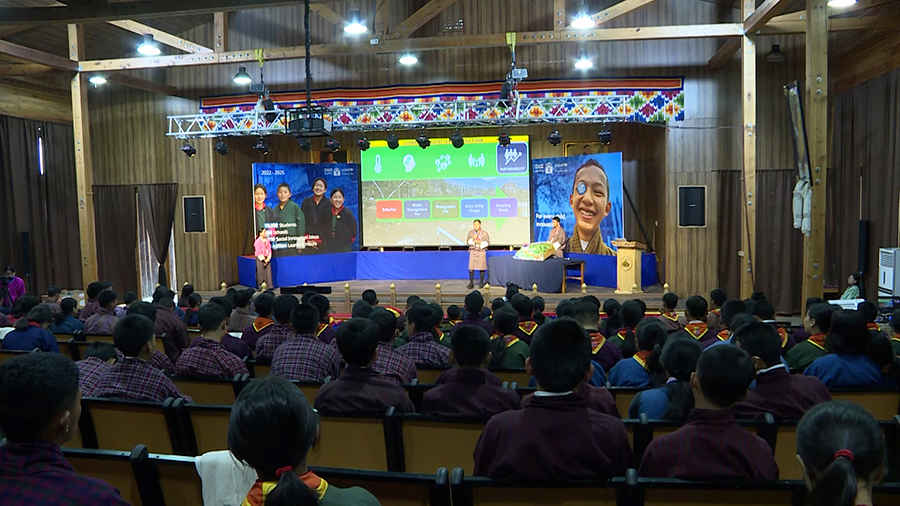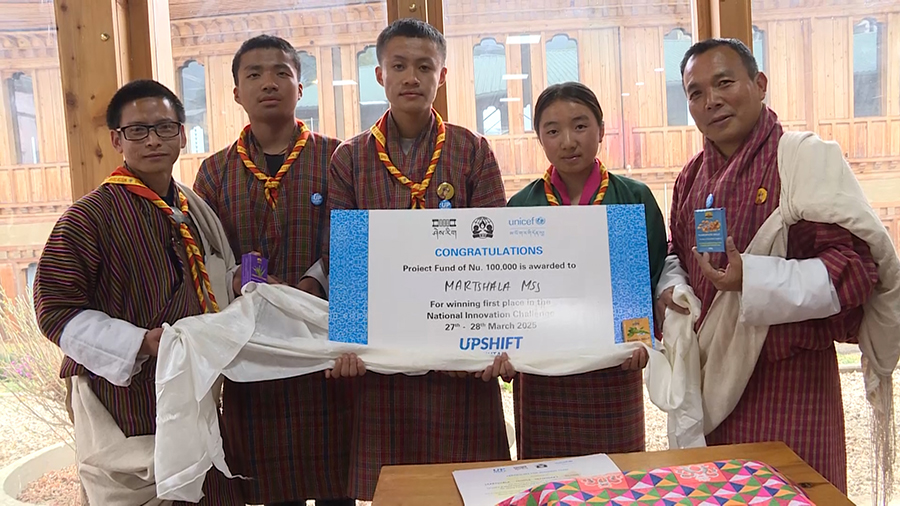 Exciting news from the National Innovation Challenge 2025! Sherubling Higher Secondary School from Trongsa and Martshala Middle Secondary School from Samdrup Jongkhar have taken the top spots. Their winning projects? A game-changing Sustainable Organic Liquid Fertiliser and the innovative Bashika Soap. These young minds are proving that creativity and sustainability go hand in hand.
Exciting news from the National Innovation Challenge 2025! Sherubling Higher Secondary School from Trongsa and Martshala Middle Secondary School from Samdrup Jongkhar have taken the top spots. Their winning projects? A game-changing Sustainable Organic Liquid Fertiliser and the innovative Bashika Soap. These young minds are proving that creativity and sustainability go hand in hand.
 The students from Sherubling Higher Secondary School, competing in the senior category, presented Sustainable Organic Liquid Fertilizer.
The students from Sherubling Higher Secondary School, competing in the senior category, presented Sustainable Organic Liquid Fertilizer.
 It is a solution extracted from organic waste. Recognising the inadequacy of manure, poor crop yield and quality, and limited access to organic fertilizers, the students developed this solution.
It is a solution extracted from organic waste. Recognising the inadequacy of manure, poor crop yield and quality, and limited access to organic fertilizers, the students developed this solution.
 The other winner in the junior category was Martshala Middle Secondary School, which created Bashika Soap.
The other winner in the junior category was Martshala Middle Secondary School, which created Bashika Soap.
 Bashika is a plant whose flower is commonly eaten; it has a bitter taste and is known for its medicinal properties.
Bashika is a plant whose flower is commonly eaten; it has a bitter taste and is known for its medicinal properties.
The team developed this idea in response to the high cost of soap in their community and the prevalence of skin diseases among their fellow students.
The two winning teams were awarded Nu 100,000 each as seed money to further develop and implement their innovations.
“Going back to school, our team will use the fund to scale up our project. Through this, we plan to have an impact on the community,” said Rinchen Om, Student at Sherubling Higher Secondary School, Trongsa.
“The fund we secured will be used to buy the materials used for soap making to produce on a large scale. If we can produce on a large scale, it will benefit the boarding schools, thereby, enhancing the education system,” said Nyingjey Lhatshok, a Student at Martshala Middle Secondary School, Samdrup Jongkhar.
“The monitoring will be done jointly by the Education Ministry and UNICEF by going on field visits and providing necessary support. In doing so, if additional funds are required, schools can discuss this with us. We will then discuss with UNICEF and relevant agencies,” said Dorji Wangchuk, Deputy Chief Programme Officer, MoESD.
The participants were judged on how well they defined the problem and the effectiveness of their proposed solutions. It was all about creativity and practicality in addressing real-world challenges.
“It begins with how the teams define their problem. In addition, once the problem is defined, the focus is on how innovative the solutions are and, lastly, the social impact of those solutions,” said Phuntsho Namgay, Judge, Officiating Director, InnoTech, Druk Holding and Investments.
Proposals came from 52 schools across the country. The best eight made it to the finals today.
This programme has been running since 2022, involving thousands of students every year and helping them see problems as opportunities.
Kelzang Chhophyel
Edited by Tandin Phuntsho









